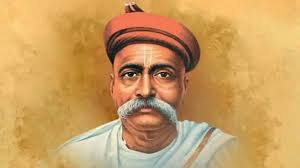100th Death Anniversary of Lokmanya Tilak | 04 Aug 2020
Why in News
Recently, the Indian Council for Cultural Relations (ICCR) conducted the webinar to observe 100th death anniversary of Lokmanya Bal Gangadhar Tilak on the 1st August , 2020.
Indian Council for Cultural Relations
- The Indian Council for Cultural Relations (ICCR), is an autonomous organisation of the Government of India, involved in India's external cultural relations (cultural diplomacy), through cultural exchange with other countries and their peoples.
- It was founded in 1950 by Maulana Abul Kalam Azad, independent India’s first Education Minister.
- ICCR has been assigned the responsibility of facilitating the celebration of the International Day of Yoga (21st June) by Indian Missions/Posts abroad since 2015.
Key Points
- Background:
- Born on 23rd July 1856 in Ratnagiri, Maharashtra.
- Lawyer by profession and also known as Lokmanya Tilak.
- Gave the slogan of “Swaraj is my birthright and I shall have it!” during Indian struggle for independence.
- He died on 1st August 1920.
- Contribution to Indian Struggle for Independence:
- One of the earliest and the most vocal proponents of complete independence or swarajya (self-rule).
- Along with Lala Lajpat Rai and Bipin Chandra Pal, he was part of the Lal-Bal-Pal trio of leaders with extremist outlooks.
- A book ‘Indian Unrest’ written by Valentine Chirol, an English journalist, stated Tilak the ‘father of Indian unrest’.
- Joined the Indian National Congress (INC) in 1890.
- Propagated swadeshi movements and encouraged people to boycott foreign goods.
- Indian Home Rule Movement was started in 1916, it is believed to have set the stage for the independence movement under the leadership of Annie Besant and Bal Gangadhar Tilak for the educated English speaking upper class Indians.
- The All India Home Rule League was founded by Tilak in April 1916 at Belgaum.
- It worked in Maharashtra (except Bombay), the Central Provinces, Karnataka and Berar.
- Lucknow Pact (1916) was signed between the INC headed by Tilak and All-India Muslim League led by Muhammad Ali Jinnah for hindu-muslim unity in nationalist struggle.
- Started newspapers namely, Kesari (Marathi) and Mahratta (English) and wrote books namely, Gita Rhasya and Arctic Home of the Vedas.
- Social Contribution:
- Founder of the Deccan Education Society (1884) along with his associate Gopal Ganesh Agarkar and others.
- Popularised the Ganesh Chaturthi festival in the Maharashtra region.
- Propounded the celebration of Shiv Jayanti on the birth anniversary of the monarch Chhatrapati Shivaji.
- Devout Hindu and used Hindu scriptures to rouse people to fight oppression.
Relevance of the Tilak’s Ideas in Present Time
- Tilak’s stand for Swadeshi products and Swadeshi movement may help today’s India to push Atmanirbhar Bharat. Thus, revival of economic nationalism can be embibe from Tilak’s ideology.
- It was Tilak’s advocacy for local languages in the Congress that made members speak in their mother tongue during its meetings. Whereas, the government has given a push to bring Sanskrit and local languages through National Education Policy (2020).
- Also, Tilak was a staunch opponent of untouchability and launched a huge movement to unite the society divided on the basis of caste and sects. Such behavioural push will help to unite Indian society further.
